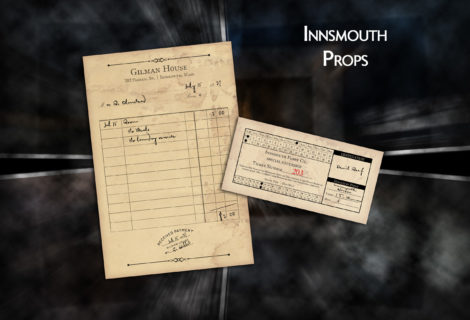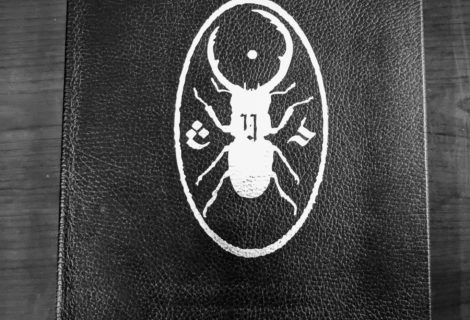On the Nature of the Mythos and Sanity
A fundamental tenet of cosmic horror is that the true nature of reality is incomprehensible to the human mind and that being faced with evidence of this reality damages the psyche. What humans perceive as the real world is only a thin veneer over a much darker truth – and that truth is so alien to our understanding that our human minds cannot even contemplate it without serious risk. This dark reality which is so alien to our perception of existence is the Mythos.
Exposure to the Mythos, even briefly, has a deleterious effect on the human mind. Sometimes we are able to delude ourselves into believing there is a rational explanation for what we have seen and heard, thus insulating ourselves from the horrible truth. At other times a person’s mind may twist and fracture to protect them from really perceiving the nature of reality – those are the lucky ones. Others are far less fortunate, as their very being is transformed to integrate the truth of the Mythos into what was once their understanding of the world around them.
One thing is always true, those that catch even the briefest glimpse of the terrible truth are forever changed.
 A character that has faced exposure to the Mythos is fundamentally changed by the experience. Their perception of reality is altered – they literally perceive the world around them differently from those that have not seen what they have seen. They see and hear things which other humans do not; their senses of taste, touch, and smell are no longer the same. They may even begin to experience sensations that do not fit our normal human concepts of the senses. This may start small, bordering on imperceptible, but as a character is repeatedly exposed to greater evidence of the awful truth of the Mythos, this change becomes even more profound. (On the GM/Keeper side of the table, this can be used to provide a player with Clues due to their character being able to perceive things other cannot. Of course, Compels based on seeing or hearing things are also fertile grounds for the Keeper to play around in.)
A character that has faced exposure to the Mythos is fundamentally changed by the experience. Their perception of reality is altered – they literally perceive the world around them differently from those that have not seen what they have seen. They see and hear things which other humans do not; their senses of taste, touch, and smell are no longer the same. They may even begin to experience sensations that do not fit our normal human concepts of the senses. This may start small, bordering on imperceptible, but as a character is repeatedly exposed to greater evidence of the awful truth of the Mythos, this change becomes even more profound. (On the GM/Keeper side of the table, this can be used to provide a player with Clues due to their character being able to perceive things other cannot. Of course, Compels based on seeing or hearing things are also fertile grounds for the Keeper to play around in.)
Of course, different characters may respond to exposure to the Mythos in different ways.
Trail of Cthulhu by Pelgrane Press recognized that there are often two different forms of “insanity” in cosmic horror. The first could be thought of as “stark, raving mad” – yelling, crying, screaming, drooling, catatonic, furious scribbling, fits, (presumably) irrational fears – everything that would cause a casual observer to think “he’s nuts.” On the other hand, there are those that appear outwardly normal, even serene, when they are really anything but. Think of a villain that wants to destroy the world to “protect us from ourselves,” a serial killer who selects victims based on whose voice will make the best addition to the “choir” in his mind, or a woman that believes her spirit must be purified by fire before she can attain godhood.
In Our Terrible Fate, each character’s long-term “mental health” is represented by his or her Sanity Aspect and Sanity Stress Track. Before being exposed to the Mythos or suffering other horrific experiences, their Sanity Stress Track is clear, and their Sanity Aspect describes their overall worldview. That worldview could be as benign as If You Dwell in the Past, You’ll Get Left Behind or as extreme as Forgiveness is Between Them and God; It’s My Job to Arrange the Meeting.
As characters encounter the Mythos and evidence of mankind’s true insignificance in the universe – not to mention other more mundane horrors that can nonetheless cause the mind to reel – they will mark off stress on their Sanity Stress Track. Certain points along the track are marked as Warped, Twisted, and Broken. As a character takes sufficient stress to their Sanity to cross these thresholds, their Sanity Aspect changes to reflect how their worldview has changed in response to all they have seen and done. For example, If You Dwell in the Past, You’ll Get Left Behind can be warped into Those that Dwell in the Past Should Be Left Behind. Later, it may become twisted into Only Those that Look to the Future Are Worth Saving.
When changing Sanity Aspects over time, players should consider how they wish to portray their character’s gradual descent into insanity. Are they fortunate enough to be incapable of grasping the truth of the Mythos, as their mind literally fractures itself, slowly cracking in a desperate attempt to shield itself from the horrible nature of reality? These poor souls may eventually be reduced to gibbering lunatics locked away in an asylum, but at least they retain some of what makes them human.
On the other hand, perhaps they are able to come to grips with mankind’s utterly insignificant place in the cosmos. Rather than protecting itself, their mind adapts and remakes itself to accept the terrible truth of reality. These are those that truly become lost to the Mythos. Though they may appear unchanged, their perceptions are so utterly altered that they no longer have the same concerns or cares as the rest of mankind. Though they may be biologically unchanged, their minds have become so utterly alien that they are, for all intents and purposes, no longer human.
In either case, once a character succumbs to insanity – be that raving madman or shell that was once human – they are no longer a playable character.
(Again, on the GM/Keeper side of things, when describing Consequences it is wise to consider how a character is being portrayed as they struggle to retain some semblance of sanity. That’s not to say that an investigator who has been gradually drifting towards megalomania and delusions of grandeur should never be temporarily reduced to a muttering, quivering lump of flesh with an acute fear of open spaces – feel free to mix things up when it makes for a good story – but a player shouldn’t feel forced down a different path into madness simply because the Keeper kept repeatedly throwing out a particular style of Consequence.)






Recent Comments